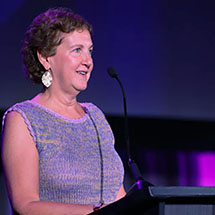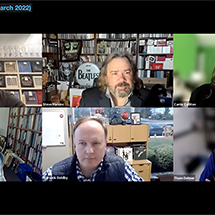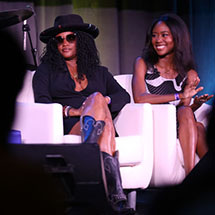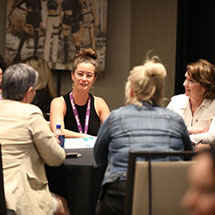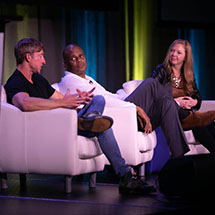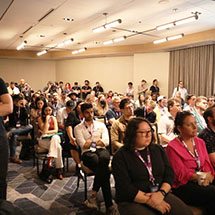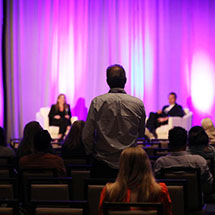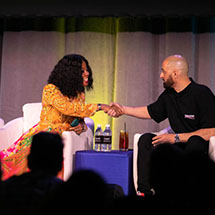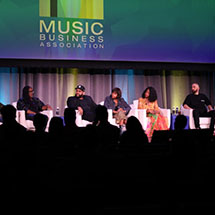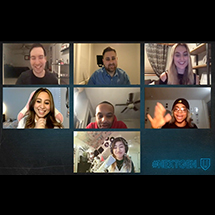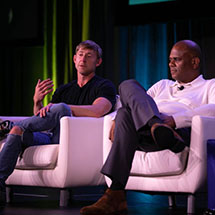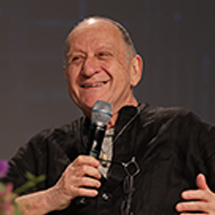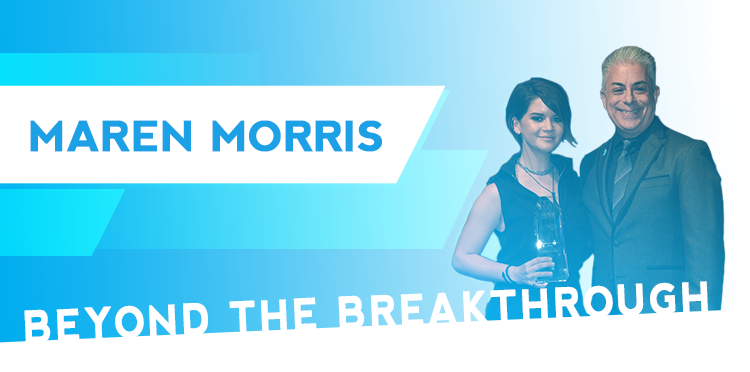
Maren Morris Talks ‘The Middle’, Album No. 2 & Beyond Breaking Through With President James Donio

Last year, the Music Business Association honored singer/songwriter Maren Morris with its prestigious Breakthrough Artist Award at its Music Biz 2017 conference in Nashville. In June 2016, Morris released her debut album for Columbia Nashville, HERO, becoming the label’s first artist of the SoundScan era to top the Billboard Country chart with their first album. Since then, she has gone on to collect multiple accolades and honors including a recent No. 1 hit on Country radio with “I Could Use a Love Song.”
In celebration of the Music Business Association’s 60th anniversary, Music Biz President James Donio recently caught up with Morris to chat about her career since receiving the Breakthrough Artist Award — as well as what it was like meeting Reba McEntire, her latest hit “The Middle” with Zedd, album No. 2, the redevelopment of Nashville, the GRAMMYs, and more!
This is Beyond the Breakthrough…
JD: You had quite the year in 2017 receiving our Music Biz Breakthrough Artist Award, as well as a GRAMMY and an ACM Award, to go along with your CMA Award and your American Music Award. How did all of that recognition feel? Was it overwhelming to go from working so hard to get noticed, and then to have hits and people honoring your talent in such a short time? What was that experience like?
MM: It was certainly an overwhelming time. I think that whole two-year span I was just flying by the seat of my pants with touring so much. So, to be up on a stage getting an award (for all the hard work) that I’ve wanted since I was a child, and me actually giving a speech, it really was out of body for me back then. You know, now I’ve gotten to reflect a little bit more on it, and I’m sort of in awe with all of the things that were squeezed into a year and a half.
JD: Are you one of those artists who watches things back that you’ve been on, like when you perform on a show or win an award? Do you like to see your own reactions and how you sounded?
MM: I watch it back a few days later. I tend to need time to just enjoy the moment when I’m in it, and it’s always such an insane experience when you’re at an award show, and I usually have family there, so I’ll take some time and watch it a few days later after it hits me. It’s not like watching a stranger, but it’s like watching someone who has no idea what was coming and how really insane the experience and validation come in just a few seconds. I’m always kind of impressed that I was able to give the speech at all, because I think if I had really known what was going on and my brain allowed me to feel everything I was feeling, I probably would have combusted. It’s just a really incredible experience, and I can’t believe that it all happened to me in such a short span of time.
JD: At the Music Biz 2017 Awards almost a year ago, I guess it was a little different because it’s not a televised event, It is a little more intimate in terms of really getting to spend time and spend time with the other recipients. So, I’m not sure whether you had met Reba [McEntire] before or Paula [Abdul] or Lukas [Graham], but certainly you got to see them on the red carpet. What was that like? Growing up, were you a fan of Reba or Paula, and what was it like to get to meet them?
MM: Yes, I’m a huge fan of all of them, but I had never met Reba before. So, she is someone I have continued to listen to, especially when I was growing up. I was just always listening to Country music radio in the early ’90s, and her voice was clear as a bell through those waves. So, meeting her in person was great — and especially at that event where it felt a lot more intimate than a gigantic televised award show. It’s like at the Music Biz Awards, you actually get to talk to people and sit down. It’s a little bit lighter. So, meeting Reba was such a joy because she really is the same person she is on TV in real life, and she was just so gracious and humble and made me fall in love with her again.
JD: Were you a fan of American Idol when Paula was on the show?
MM: Oh yea, absolutely. I think I was in 7th grade when the first season aired. I didn’t really listen to her music growing up, but you know it was clear that she was such an icon, and then she had this gigantic career as well with that show. Like most of America, I was also watching American Idol back then. She had such a great speech that day (at the Music Biz Awards). I felt like all the speeches were so heartfelt and genuine, so I really respected her even more after that.
JD: Let’s talk a little bit about Nashville. This is now looked upon as the global music city, and we’ve made a commitment to keep the Music Biz conference there for at least the next three years. How has it changed since you moved there? What do you think of everything that’s happening there?
MM: Well, I certainly sit in traffic longer than I did five years ago. But, with such monumental changes to a city, you see all these changes happening like gridlock. You see an influx of people buying and renting houses. It’s just such a crazy market there right now, and then you know it’s kind of funny the last few years that I’ve been gone so much on the road, I feel like it’s changed even more. I’ll drive up Music Row and nothing looks familiar to me. It’s kind of bittersweet because I spent years of my songwriting life just driving up those two or three blocks and going to my writes and slinging my guitar from my trunk and the publishing house. Now, when I go to meetings on Music Row or if I’m ever writing, I get lost because I have no idea where my landmarks are anymore.
JD: Let’s talk a little bit about the GRAMMYs from this year. You participated in the tribute to the victims of the Route 91 Harvest Festival massacre in Las Vegas. Your perspective on that is really unique because you performed there, and here you are now memorializing those people who were killed. I can’t imagine what that was like, but tell us a little bit about how you felt on GRAMMY night.
MM: Yeah, it was certainly emotional. I just remember the entire experience and feeling so grateful to get to have that platform because we all were there that weekend of the Festival. It was so special for us four to be chosen by the GRAMMYs, and to have that few minutes on the show to pay tribute to the fans that we lost as a country and as a genre. That was really, really heavy. But, I remember being so thankful to get to do it and also so grateful to not be doing it alone. So to have Brothers Osborne, who I’m really good friends with, and Eric Church up there and we could all share that moment together, it made it feel a lot more cathartic to band together, literally, and have this moment to pay tribute to the victims and the survivors. I mean, it was emotional once the camera is on you when the lights go down and you’re singing this beautiful song, and then it hit you right when it’s happening live. So, it was definitely emotional, but we all just hugged each other after the performance and, just, I think we all felt the world stand still a little bit, and we got to experience that together.
JD: I love your song “Dear Hate.” I know from talking to people and hearing what you’ve said about it that you did hold it back from your debut album, and then you did release it as a single in the wake of the Festival shooting. How did it come about that you did it with Vince [Gill], and what was your thought process about making that decision both to not have it on the album and then to release it when you did?
MM: That song is such a specific concept that you can’t just slap it on a record, especially on a debut album, and have it ring clear or make sense. It has to be a part of the narrative in a story, and it’s just a really tough song to perform, to write, and to release. There really was no perfect time. I had met Vince Gill at ‘All for the Hall’ at the Bridgestone Arena like two years ago. And that’s where we first met. I was on the show with him and Keith Urban, and we met and he was so sweet to me, and he came up to me after the show and just said, “We need you in this genre.” And I was so bowled over because you know he’s Vince Gill. He’s like the “Mayor of Nashville” to me musically. So, I reached out to him a couple of days later, and I said, “Hey, it was so nice to meet you. I have this song, and you can totally say no. The second that I realized your voice and how beautiful your tenor is, it would be so perfect for this song.” And so I sent it over to him, and he got back to me within a day and said that he would love to be a part of it. So he came in, and he put some guitars on it, and he took it home and sang vocals and sent it back to me. I was just so emotional hearing his voice on the song.
JD: There’s a lot of discussion now in the industry about this being a defining moment of sorts. You know artists are regaining more and more control of their careers and being more involved in the business side, and not just the creative side. Where is your head right now in terms of how the business has changed? Obviously streaming is now the predominant way that people are consuming music. What’s your take as an artist? How are you feeling about how the industry and the business are changing?
MM: Again, like with the gentrification of Nashville, there’s bitter and sweet. It’s the same with the way people consume music now and the technology of streaming. I can’t really knock streaming because it opened such a floodgate for my career when I released “My Church” a few years ago on Spotify. But I still feel very traditionalist in the fact that I love making albums. And I know that people are saying we’re in a single-based world now, but I still really, really believe in making albums. I’m always going to stick by that, and I completely understand people loving singles. But, I like listening to a body of work from an artist that I love. So, while I think technologies such as streaming are breaking down genres, and I love that because I don’t listen to just one type of music, and I don’t think that’s the way young people listen to music anymore. I still want to teach the art of the album in these kids’ minds because it still is a body of work. It’s still a chapter that they really need to listen to, so that’s kind of how I feel about it.
JD: You just gave me the perfect segue into my next question. I’m obsessed with your new song “The Middle.” This is such a different turn for you. How did this come about? Are you thinking about incorporating more EDM and Pop elements into your music? Or, is this a one time thing that fell into your lap and you just wanted to do it?
MM: You know, when you listen to my first album, there are elements of the tracks going on. I mean Busbee, my producer, is from L.A., and he lives in Nashville part-time, so he already understood my blend of real instruments and tracks. And, so it really wasn’t a major departure for me to be on the Zedd song. I think for my own personal music in the album that I’m making right now, it’s still very rootsy, and it has elements of Pop, and has elements of Country and R&B. But, you know, that was sort of it’s own world with me being a part of that song. I just, I heard it and I loved the lyrics. I loved the melody of the song, and that’s his wheelhouse. I’m not going to ever encroach on EDM.
JD: So you’re winding down the cycle for the debut album, and “Rich” is going to be the final single, and you’re going to be touring with Niall Horan. What can you tell us about what you’ve written so far for the next album? What kind of vibe are you feeling at this point?
MM: It’s just a lot happier of a record. It’s more vulnerable. I think a lot of that has to do with the headspace I’m in. I’m getting married in a month and not afraid to write those songs. There’s a lot of that. I wrote yesterday like, it’s still in the thick of the last few writes they have on the books before we start recording. It’s really emotional, but it’s fun like the first record. But it’s more grown up. I’ve become a better songwriter in the last few years. The lyrics are more mature. Yeah, it’s growing up and it’s still me, you know, you can’t change it like that.
JD: You may have heard that this year Julia Michaels is getting the Music Biz Breakthrough Artist Award that you got last year. Like you, she started out in the business as a songwriter and now is finding her voice. I guess we’re continuing a trend we started a few years ago when we honored Meghan Trainor, who followed a similar path. So, what’s your advice for the newcomers? I’m sure you meet a lot of young, aspiring songwriters and artists. What do you say to encourage them to navigate this business because it’s not an easy business?
MM: Artists ARE their voice. They already have their point of view. Julia, and I am so obsessed with her project, I think she’s been killing it the last year. I’m not surprised at all that she is where she is because I think she’s always been such an amazing writer, and such a unique voice that people want to hear that perspective from songwriters. I think the beauty of more female songwriters is that it produces more female artists.
JD: It was fun running into you and your fiancee Ryan [Hurd] last month at the GRAMMYs. One of the first things Ryan said when we were chatting was that he remembered your Music Biz Award because he knew exactly where you keep it. So, where exactly do you keep your awards?
MM: We had to build shelves to withhold the weight of our awards, because you know Ryan is a really accomplished writer and artist. And, then I have this church pew that my parents gave us for Christmas last year. I have a little end table that I have my Music Biz Award and my GRAMMY and my CMA on. They are all friends!
JD: Well, we’re excited to know that our Music Biz Award is sitting there alongside the GRAMMY and the CMA. 2018 is actually the 60th anniversary for all three. It’s our Association’s 60th year. It’s the GRAMMYs 60th year, and the CMA’s 60th year. We’re going to be celebrating all of that at the Music Biz conference in May in just a few months. That said, thank you so much for taking time to do this. It’s kind of a new thing that we want to put out into the world. As you know, we recognize young artists when they’re breaking through, and we want to continue that relationship once you’ve broken through. It’s just been amazing to watch your career grow and what happens next. So again thank you so much.
The Music Business Association will celebrate its 60th anniversary at MUSIC BIZ 2018 — set to take place Monday, May 14 through Thursday, May 17 at the Omni Nashville. The 4-day innovative event will bring together global power players and industry enthusiasts committed to the future of music monetization for 100+ panels, presentations, workshops, private meetings, cocktail parties, live music, and more.
Highlights will include keynotes from YouTube’s Lyor Cohen, mega-manager Scooter Braun, and Republic’s Wendy Goldstein; Digital Service Workshops with Amazon, Apple, Facebook, Pandora, SoundCloud, Spotify, and YouTube; Music’s Leading Ladies Speak Out powered by Nielsen Music; the Awards Breakfast sponsored by CMA featuring special presentations to the RIAA’s Cary Sherman and the Radakovitz Family of Dimple Records’; and the Awards Luncheon sponsored by BuzzAngle Music & TiVo honoring breakthrough singer/songwriter Julia Michaels, Scooter Braun, and Latin hit “Despacito”, and more to be announced. The full preliminary schedule can be accessed at musicbiz2018.sched.com.
Register today at musicbiz2018.com to join the 2,000+ attendees expected to descend on Nashville for the four most important days on the industry calendar!

